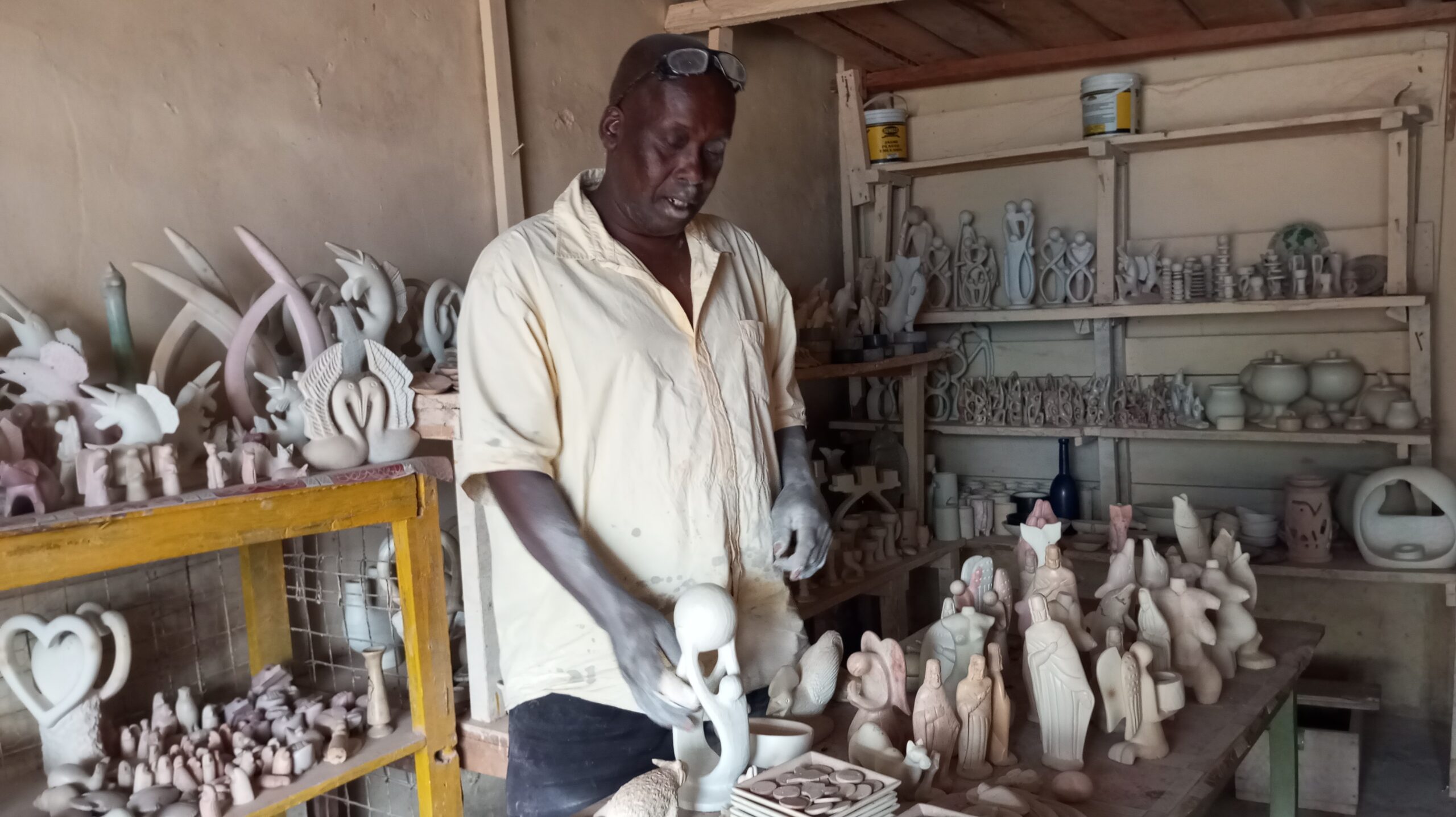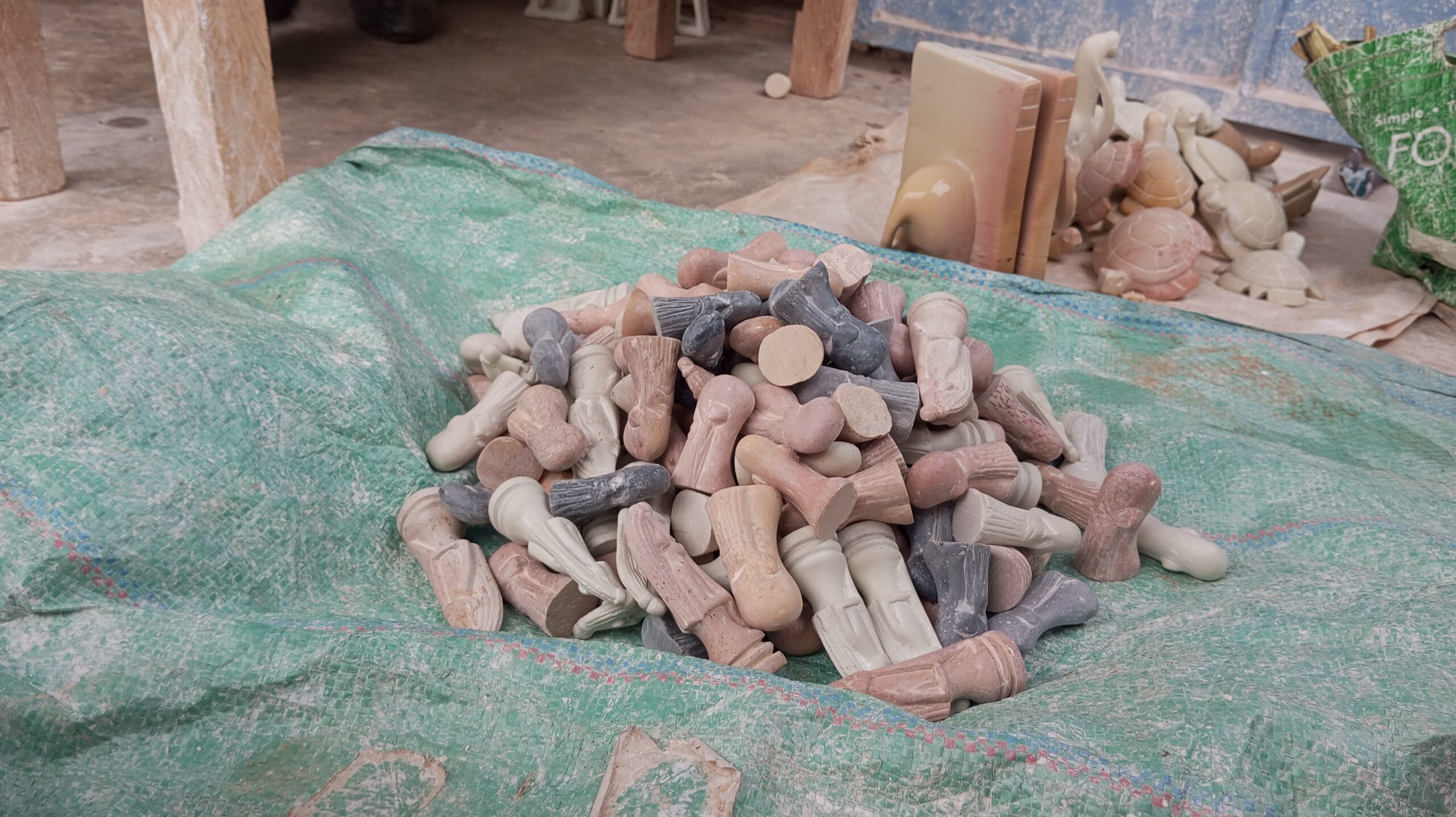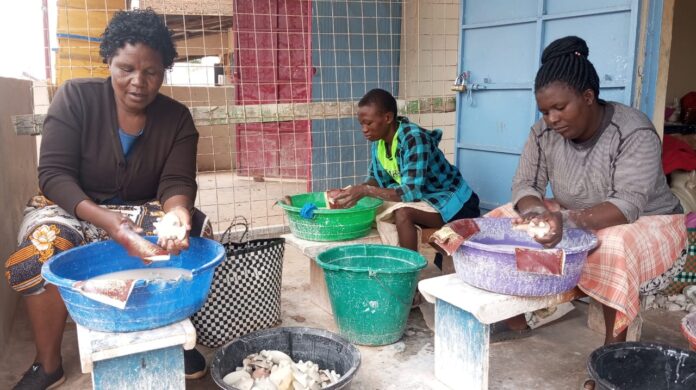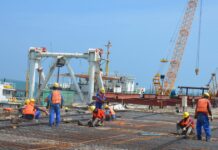By Lenah Bosibori
Tabaka, Kenya: As the sun dips below the horizon, Daniel Abuya stands behind his modest soapstone shop, waiting for a sale that may never come. It’s been a long day, but there’s no sign of customers. “Sundays used to be busy, but today, not a single item has sold,” Abuya laments.
Abuya 54, one of the oldest miners since age 12, has spent over four decades carving out a living in the soapstone mines of Tabaka. Yet, despite his skill and dedication, he has little to show for it. “I have nothing saved, and beekeeping is the only side job I can manage,” he explains.

For the people of Tabaka, soapstone carving is not just an art form but the backbone of their economy, sustaining thousands of families since the late 19th century. Yet, this local treasure has left miners poor and trapped in a network controlled by middlemen, export barriers, and foreign corporations.
Middlemen and Financial Exploitation
Evans Kenyanya, another miner, shares the same sentiments as his colleague Abuya. He is also disappointed by the role middlemen play in the soapstone trade. “Middlemen have ruined us,” he says, describing how brokers force down prices, often taking unique designs and selling them for higher profits. “I’ve been working like a slave for the rich, who come and steal my ideas to make more money from tourists.”
He said their work is underrated. Middlemen control market access and prevent artisans from selling directly to consumers. Kenyanya, who once made a decent living selling beautiful carvings, now grinds by, earning just enough to cover his children’s school fees and daily needs.
“I make Sh 700 ($5.4) daily from this business; this is only enough for my daily expenses. I can’t save anything, but I am happy to be in the rural area where daily expenses are a bit lower compared to people in towns,” shares Kenyanya.
The Cost of Bureaucracy and Limited Access to Markets
Barriers to direct sales and exports also hurt the miners. Excessive permit fees, set as high as Sh 4,000 ($31) per ton, make it difficult for local artisans to access international markets, forcing them to rely on brokers. “County officials charge too much, trapping us in poverty,” says Jane Zablon, a local shop owner who struggles with high rent and licensing fees.
Mr Daniel Apepo, a former Tabaka Ward County Assembly Member (MCA), adds that doing business with these high technological advancements has become difficult.
“What our miners need is not to sit down and open their shops waiting for customers,” shares Mr Apepo, jokingly asking the writer whether she owned any of the carvings. “They need capacity building and a trip to any part of the world’s trade and expo fairs to connect with the international community, which will offer a direct market for their produce.”
“Previously, initiatives by Kenya’s Export Promotion Council helped connect miners to foreign buyers. Still, these programs have largely disappeared, leaving artisans with few options,” shares Apepo.
A 2022 audit report from the Office of the Auditor General titled ‘Performance Audit Report on Monitoring of Artisanal Mining Operations by the Ministry of Petroleum and Mining’ highlights how unregulated artisanal mining has allowed minerals to be smuggled out of the country without proper revenue to be collected.
“The audit by the auditor general established that the miners’ cooperatives were yet to offer marketing services; further, there was no system in place to track the minerals bought by the middlemen, raising the risk of the minerals being smuggled out of the country without the revenue due being paid to the government,” read part of the report Monitoring of Artisanal Mining Operations (2022).

Artisanal mining, when conducted without government oversight, enables the extraction and sale of minerals without proper documentation or taxation. This lack of regulation can lead to the illegal transportation of these minerals across borders or their sale on the black market, circumventing official export channels and duties. As a result, unrecorded and untaxed mineral sales lead to governments losing revenue, as they miss out on taxes and fees that would have been collected from regulated operations.
Foreign Competition and Systemic Poverty
In addition to local challenges, foreign corporations have entered the market, according to Apepo. “Multinational companies get the stones which they later mould using advanced machinery to produce more than 10,000 pieces daily, making it nearly impossible for Tabaka’s artisans to compete,” says Abuya.
This arrival of cheaper, machine-made products has dwindled demand for handmade soapstone carvings, lack of measures and ways to bring back the profits to boost the local economy have left the miners struggling.
Further, Apepo adds that the permit fee for accessing the quarry has increased from Sh 30,000 to Sh 500,000, making it only accessible to multinational companies who can afford the fee.
“If you look at this permit fee, no single local miner can afford it, this will also affect the over 100,000 people who rely on this business,” adds Apepo.
The lack of a local factory, cooperatives and the middlemen’s monopoly leaves many miners with unsold products. “We used to get tourists in the past, but middlemen have diverted them,” Zablon says.
Mining and Blue Economy Cabinet Secretary Ali Hassan Joho, speaking at an event in Siaya County in August, acknowledged the loss of revenue through smuggled and unprocessed minerals and ordered an immediate crackdown on all unlicensed mining across the country.
“Kenya is losing billions of shillings in revenue due to smuggled and unprocessed minerals which could be invested in national development,’ Joho disclosed.
Further, Joho said that to curb the illegal smuggling of minerals, the Ministry of Mining and Blue Economy, in partnership with the Ministry of Cooperatives and MSMEs, will help license the small-scale artisan miners.
He added that the government will also help them form cooperatives to cushion the small-scale miners and further dispatch mining officers to key points across all mining areas to oversee any illegal activities.
“The project received support from the Thomson Reuters Foundation as part of its global work aiming to strengthen free, fair and informed societies. Any financial assistance or support provided to the journalist has no editorial influence. The content of this article belongs solely to the author and is not endorsed by or associated with the Thomson Reuters Foundation, Thomson Reuters, Reuters, nor any other affiliates”.














